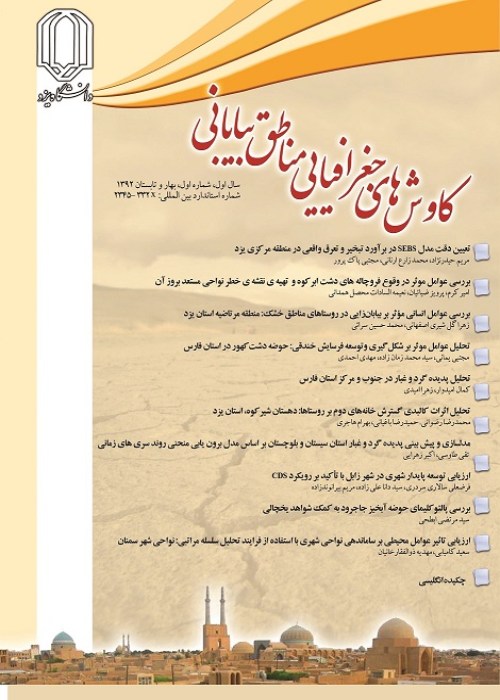Economic Evaluation of Yazd Desert Ecotourism with Approach Sustainable Development
Ecotourism is a relatively new phenomenon in the tourism industry, which is only a part of the whole industry and has led many countries around the world to invest heavily in this sector. Walking in deserts and visiting desert attractions, vegetation, animal life, morphological forms, doing sports activities, has created a special type of tourism that is called "desert tourism". Economically, giving monetary value to the environment and natural resources, despite all its shortcomings, is needed for better decision-making and planning to use these resources and generate revenue. Economic valuation means determining the quantitative values of goods and services that these goods and services may have market prices or non-market prices. Since most environmental goods are non-market goods and are considered public goods, their economic valuation is not simply the pricing of private goods. In the environmental economics literature, there are different methods for valuing such goods, and the conditional valuation method is one of them. This method was first used by Grace in 1974 to measure the benefits of reducing soil erosion, which is then used to value environmental amenities and wealth and other goods for which there is no market to trade. This method uses interviews or questionnaire forms to extract people's willingness to pay for changes in the supply of quality goods or services. Meanwhile, the economic valuation of ecotourism is an effective tool for more accurate planning for the development and proper use of ecotourism projects. Determining the economic value of the project along with environmental valuation is one of the advantages of this tool. Yazd province is located in the center of Iran, on the edge of Lut plain, and desert is one of the dominant landscapes in the region. In general, about half of the province is covered by deserts, hills and sandy areas and saline lands. The deserts of Iran in Yazd province are one of the most beautiful ecotourism landscapes in the world; As sand dunes are one of the processes of desert areas that have spread around the city of Yazd with an area of about 30,000 hectares. Therefore, valuing this natural resource is important for economic development and growth as well as environmental protection. The present study is done with using 6 indicators and models to determine the economic value with the approach of sustainable development of Yazd desert. Also, using the conditional logit model, have been calculated the factors affecting acceptance and non-acceptance in different amounts. This research is of applied type and in terms of research method, it is descriptive-analytical. The statistical population of the study was tourists in the desert areas of the world city of Yazd, which was randomly surveyed out of 100 people in the form of a questionnaire. In this research, two methods have been used to measure the value of the desert. The first method is contingent valuation (CVM) using the generalized least squares (GLS) model and cross-sectional data. Annual to prevent desert destruction, willingness to pay once to prevent desert destruction, average willingness to pay to prevent desert destruction through the establishment of industries annually or once and willingness to pay for sustainable desert development is estimated. According to this approach and in order to estimate the value of Yazd deserts, the expressed preferences such as travel expenses and the stated preference such as conditional valuation method are used and while estimating its value, the variables affecting the value of this public good are estimated. Conditional valuation method is one of the most widely used methods in environmental valuation studies, which, because it is based more on real data than hypothetical, can provide real values about the cost of better regional travel. In fact, the reason for using this model is to assess whether the desirability of natural resources such as the Yazd desert is such that the tourist is willing to pay an entry fee and even taxes to use and protect this tourism resource for its sustainability or not? Using the results of questionnaires and using the conditional valuation method and generalized minimum squares, the value of Yazd desert was calculated and the factors affecting it were calculated in the form of 6 models and the results show that the willingness to pay Achieved 270,000 Tomans and annually to prevent the destruction of Yazd deserts is 20,000 Tomans, which seems to be less than half a percent of per capita income in Iran. Also, significant effects on patterns of willingness to pay, variables of distance, value of travel and the number of travel days seen, so that even the distance of residence and the number of family members had a significant effect on willingness to pay. The outputs of the conditional logit model show that the variables of having goals other than travel, travel enjoyment, gender and finally education level are the factors that have influenced the approval or rejection of the request for payment of the set limit (50,000 Tomans).
- حق عضویت دریافتی صرف حمایت از نشریات عضو و نگهداری، تکمیل و توسعه مگیران میشود.
- پرداخت حق اشتراک و دانلود مقالات اجازه بازنشر آن در سایر رسانههای چاپی و دیجیتال را به کاربر نمیدهد.




